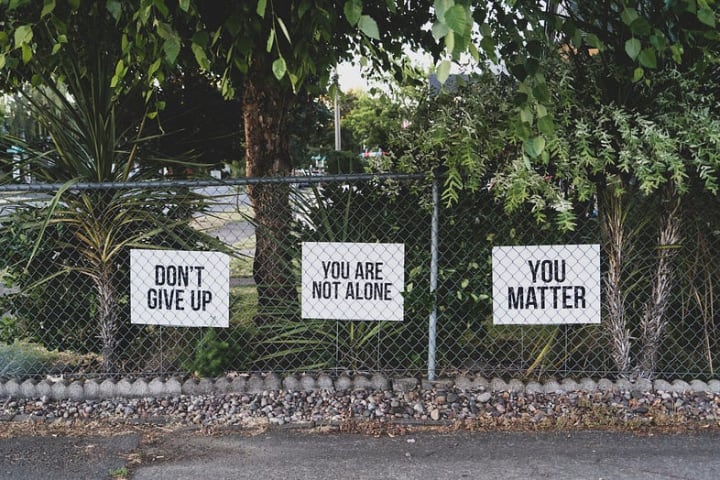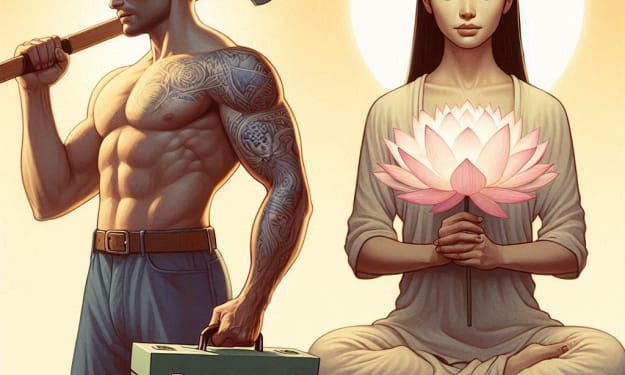Two Kinds Of Thoughts Mean You're In Trouble
The differences between active and passive suicidal thoughts.

Note: This is from my experiences in life, as a professional, and as someone who found themselves with a dark thought, once upon a time. I’m not a trained mental health professional or even a doctor. If you’re having suicidal thoughts, please talk to someone or call 1–800–950–6264 before you do anything.
We all understand people who are suicidal desperately need someone to reach them. Many of those people want someone to hear their cries for help. What about those people that are hoping death finds them? Let’s look at the two and the subtle differences.
What seems like a lifetime ago, I asked my college psychology professor a question. What’s the difference between suicidal people and those who have a death wish? He gave me an answer and asked me to stick around for a moment after class was done. His concern was that anybody asking such a question might need to talk. He later elaborated on the differences the two types of people have, getting past the answers the American Psychological Association defined.
The simple answer is that suicidal people can be placed into two categories, actively suicidal and passively suicidal. Someone that’s actively suicidal has a plan or idea of how to end their life. They may have a date, a place, and even a time they chose to end their life. In the case of passively suicidal people, they want to die and hope to die, but they have no plan to die. As a first responder, an officer, and someone who’s lived, I’ve met both types of people.
Both people need help. One of them we know very well. They are the tragically successful people who formulated a plan and carried it out with success. The others are those people on the ledge that are restrained by something, unable to do it themselves, but desperately want it to happen.

Passively Suicidal People And Wanting Death
Passively suicidal people want to die. They think about it often, wishing that death would come for them. People who are passively suicidal struggle with thoughts of suicide the same as those that are actively suicidal. They just haven’t planned out their death or acted on the plan.
“Can death really be this busy.”
— Unknown
People who are passively suicidal can be suicidal for long periods. Passively suicidal means you wish to die. It’s simple but complex at the same time. Though different than active suicidal thoughts, passive thoughts may still be destabilizing and disrupt a person’s life. They need to be talked about.
While most people have encountered someone who was actively suicidal, oftentimes looked at as the most serious or most emergent of the two, there are slightly subtler signs that passively suicidal people are known to show. Have you ever heard someone say any of these, or something conveying the same message?
- Can death be this busy?
- I wish I was never born.
- They, or the world, would be better off without me.
- I hope I don’t wake up.
- Can someone please crash into my car?
It might not be in words. Passively suicidal people may daydream about their death. Chances are, the more they daydream about dying, they’re passively suicidal. Many people have had a death dream, dreamt of their funeral, or even that they attended their funeral and saw the people there.

“Passive suicidal ideation — known as suicidal thoughts — is when an individual has frequent thoughts about death and suicide without a plan or intention of harming themselves. It differs from active suicidal ideation, which includes having a detailed plan and the means to carry out the plan. Although passive suicidal ideation does not always lead to suicide, it is a serious problem that no one should ignore. We cannot control other people’s thoughts or feelings, but we can provide support and resources to those who may be experiencing suicidal thoughts. Some use it as a coping mechanism to deal with difficult life circumstances, while others may be experiencing a mental health disorder.”
— Harold Hong, MD, Psychiatrist in October 2022 PsyCom
So, the difference between planning to die and wishing to die, or active versus passive suicidal ideations is having a plan of action and planning to carry it out.
What drives a person to want to die? What are the risk factors?

Risk Factors For Suicidal Intentions
No definitive answer exists to explain what causes someone to try ending their lives or even to wish their lives would end. With all the cases of suicide each year, it’s a mental health crisis with no end in sight.
In 2020 The CDC Reported:
- 45,979 died by suicide in the US. 1 Death every 11 minutes.
- 12.2 million adults seriously thought about suicide.
- 3.2 million adults planned suicide.
- 1.2 million adults attempted suicide.
In the time it’s taken to write this article and refresh my memory about suicide and everything I know, which relatively fits into a thimble, no less than 9 people will have died of suicide. That’s 9 people that desperately needed someone to reach out to them, remind them that they are loved, or that they matter, and offer to help, to listen, or to support them through their struggles.
People at risk for suicide may be dealing with any of the following:
- Aspects of family history, including violence, child abuse, neglect, trauma, or suicide increase the risk of someone experiencing suicidal thoughts.
- Coming out as someone in the LGBTQ+ community without the support from family or friends.
- Relationships with friends or loved ones that committed suicide.
- Hopelessness, seclusion, loneliness, or fear.
- Continually participating in reckless or impulsive behaviors, especially self-destructive behaviors.
- Lack of access to mental health care.
- Chronic illness, especially with poor treatment options to improve their quality of life or reduce symptoms.
- Life problems such as issues at work, financial issues, relationship struggles, excess stress, and a million other things can go wrong.
Can You Wish To Die And Not Be Suicidal
This is a complicated answer according to the opinion of my psych professor in college. Initially, he didn’t believe so, based on the definitions of suicide.
During the course of the discussion, I realized that I was questioning whether someone was suicidal or not. At that point in my life, I’d never experienced a truly suicidal thought, but I had experienced someone that was passively suicidal.
For nearly 20 years I knew someone that was passively suicidal. They chose to do everything wrong. They were carrying guilt, self-loathing, and anger at the world that I didn’t understand. That was the cause of someone wanting to die, but never actively acting on that desire.
Did I ever actually find someone that wished they could die but wasn’t suicidal? The answer is complicated. The short answer, under the defined diagnosis of suicide, is no. As my college psychology professor said, it’s more complicated than that.
On a cold and busy night in March of 2015, I had just done my fifth arrestee of the night and stopped to get a soda and take a breather. At the time I was suffering from post-concussion syndrome. I had just suffered my fifth concussion a year ago, due to a violent encounter. I was still, very much, suffering from severe headaches that doctors couldn’t make go away. Migraines that lasted for days and were at times debilitating until I self-medicated.
Walking into our control center, I encountered a friend from another division. He obviously could see something in my face because he asked me if I was dealing with another concussion headache. I admitted I’d felt better and grabbed a diet coke out of the refrigerator. I don’t remember exactly what he said, but it was words to the effect of, I can’t believe they can’t do anything for you. It was my response that wound me up in a jam. I remember it well.
“Short of a bullet through the brain, I think I’m stuck with these headaches.”
— Me
I finished my shift, handled more business than guys younger than me could handle on a busy night and went home to sleep. I slept for four hours until my boss woke me up and told me he was coming to my house. I now found myself on paid leave, my badge and gun held pending a psych evaluation.
I went the next day and met with the psychologist. We had a long talk. He read the statement I’d made that morning before finishing my shift. He asked me a question, was I intent on killing myself? He asked me another question, did I want to die? On some days, momentarily, in the throws of more pain than I’d ever dealt with, I wondered if death was my only way out of the migraines that made me physically ill. On the worst days, I might have wished death would hurry up and find me.
The department-chosen psychologist diagnosed me with depression due to prolonged and chronic pain, and a sense of hopelessness over the situation. He recommended therapy to help work through my angst over the situation, as I had some reasons to be angry. Because I detested the idea of committing suicide and what it would do to those that I loved, to my friends at work, and to people I knew, he didn’t find me to be suicidal.
I had no plan on dying. I had no plan on giving up, even as I uttered the phrase, short of a bullet through the head. Truthfully, I wondered if I was passively suicidal. As it turns out, I was just grumbly, in an environment prone to sarcasm, and tired of people commenting on how I looked like crap when I suffered the worst migraines.
So, based on my diagnosis, and the department shrink getting my gun back in just two sessions, I got my answer to the question I’d often wondered about. Can a person wish to die, and not want to die, or be suicidal? It’s possible, at least according to the guy with all that fancy schooling and experience.
How did I solve my obvious issue with my department? When I got my gun back, I guaranteed them that if I ever got to the point that I felt I was unfit to have my gun, a risk to myself or others, I’d turn it in myself. I put it bluntly, this job wasn’t worth my life and if it ever broke me mentally, or I found myself hating the idea of coming there, I’d quit and leave. Other than that, I finished the department therapy that they were going to pay for anyway, because why not. We’ve all got issues and therapists can help with our issues.

Takeaways
Ending one’s life is something that can’t be taken back. It’s a very permanent solution to what can become a temporary problem. That’s been my belief since I first heard the saying in my high school psychology class. I still believe it to this day.
However, some people get so bogged down by the problems that life throws our way that they can’t see an end in sight. They can’t find the light at the end of the dark tunnel. And, that is when people lose hope. In the correctional world, those were the most dangerous people we dealt with, in my opinion. Men with no hope had nothing left to lose.
In the real world, as long as there’s one more tomorrow in front of us, we have something to lose. One more chance to see a sunrise on a new day might mean the difference between giving up, carrying out that plan, and never knowing what could have been.
Over the past 2.5 hours 13 or more people likely committed suicide successfully in the United States. That’s not counting the ones that have attempted suicide, a number far higher, and those that are still formulating a plan or seriously thinking about killing themselves. Who do you know that might be silently suffering the thoughts of ending their lives? What can you do?
You can find out by calling:
National Alliance on Mental Illness 800–950–6264
National Suicide Prevention Lifeline 800–273–8255
Call or text 988
Go to 988 Lifeline.org
If you’re suspicious or expect someone may need help, be there for them, listen to them, pay attention, and ultimately show them that you care.
About the Creator
Jason Ray Morton
I have always enjoyed writing and exploring new ideas, new beliefs, and the dreams that rattle around inside my head. I have enjoyed the current state of science, human progress, fantasy and existence and write about them when I can.
Enjoyed the story? Support the Creator.
Subscribe for free to receive all their stories in your feed. You could also pledge your support or give them a one-off tip, letting them know you appreciate their work.
Reader insights
Outstanding
Excellent work. Looking forward to reading more!
Top insights
Easy to read and follow
Well-structured & engaging content
Expert insights and opinions
Arguments were carefully researched and presented
On-point and relevant
Writing reflected the title & theme






Comments (2)
Awesome job! Thank you! It is heard better from someone who has been there.❤️
This was expertly written, empathetic, nonjudgmental, source supported, personal, and helpful. All around excellence.